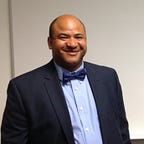Black Bodies and America: A Perpetual Nightmare. Part 1 To Breathe or Not to Breathe
In 1963, Reverend Dr. Martin Luther King Jr. delivered one of the most inspirational speeches in human history. He poetically declared and expounded upon the phrase I Have A Dream. In response to King’s dream speech Malcolm X said, “While King was having a dream, the rest of us Negroes are having a nightmare.” In the 57 years since that speech, most White Americans have grown to celebrate the dream and ignore the nightmare.
There are very few Black people that I know who are not deeply triggered by these three words — I can’t breathe. The most recent iterations of White men denying Black bodies access to free air are haunting. They are a recapitulation of the same reoccurring nightmare. A nightmare that has continued for 400 years. It can be encapsulated in Shakespearean fashion. To Breath or Not to Breathe. However, unlike Shakespeare’s story, far too often, Black men, women and children do not get to decide their own fate when pondering this question. When I saw the horrifying murder of George Floyd, a Black man, at the hands of 4 White police officers in Minneapolis, I began to excogitate breath and being a Black man in America.
I saw the White officers led by Derek Chauvin who casually committed murder as a normal procedure. It was Eric Garner 2.0 — suffocation by a knee on the throat. I thought… how can this officer do this for nearly 9 minutes with his hand in his pocket and still not letting up while George Floyd’s body went lifeless? All while hearing Floyd plead for his life, telling the officers that he could not breathe several times, and eventually calling for his deceased mother.
This reoccurring nightmare conjures up statistical probabilities and forecasts for Black folk breathing. In the Black American nightmare, the forecast for freedom of breath looks like a 0% chance of surviving a knee on the neck (George Floyd); 0% chance of surviving when jogging and being hunted by White men (Ahmaud Arbery); a slight chance of surviving no-knock raids (Kenneth Walker lived, Breonna Taylor and Aiyana Stanley-Jones did not); 0% chance of asking for help then being shot in the face with a shotgun in a White neighborhood (Renisha McBride); and, almost no chance of surviving playing with toys (Tamir Rice and John Crawford), listening to music (Jordan Davis), or relaxing at home (Botham Jean).
As my wailing wall expands to accommodate the names of the fallen — Black men, women, and children who could not survive being Black while ___________, I have come to understand that civil rights for Black bodies is synonymous with breathing rights. George Floyd and countless other recent examples of structural racism combined with the global pandemic, ecological devastation, etc. is forcing us to consider how to reframe W.E.B. Du Bois’ question of whether it is possible to be both Black and an American. What is the possibility to breathe free air for Black bodies in America?
To breathe or not to breathe for Black bodies in America is more than a question. It is a contemplation as to how much it cost for us to breathe. There is no such thing as free air for Black people. From the time the first Africans set foot on this soil the cost of breathing became a White male capitalist venture. Steeped in patriarchy and bound by sexism, the Black body was commodified and exploited for its ingenuity and dexterity. The only way for air to be accessed by Black human beings was to pay — with psychological, physiological, and biological currency. Reduced to being rendered as hands, feet, and wombs, Black bodies have endured this perpetual nightmare in relative silence because of White solidarity fueled by minimization, denial, and blame.
What Malcom was trying to get America to realize was that it is easier and safer (for White folk) to elevate King’s dream than accept Black folks’ nightmares. The irony here is that America really does not accept our dreams either. Remember, King was the most hated man in America after he gave his dream speech. Therefore, in truth, to breathe or not to breathe for Black bodies in America is a Dream and A Nightmare.
